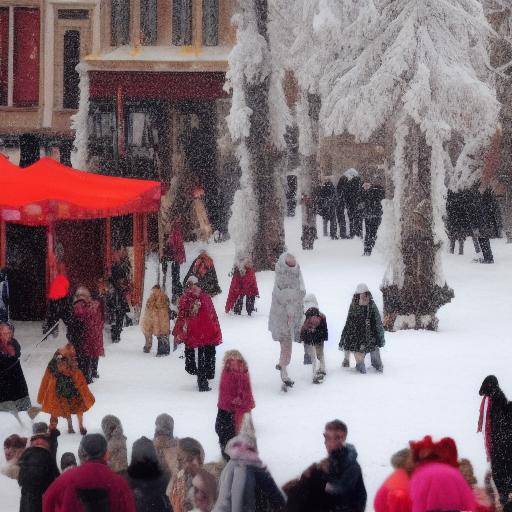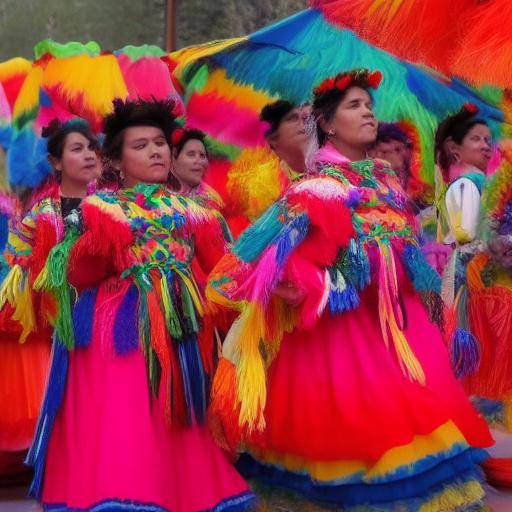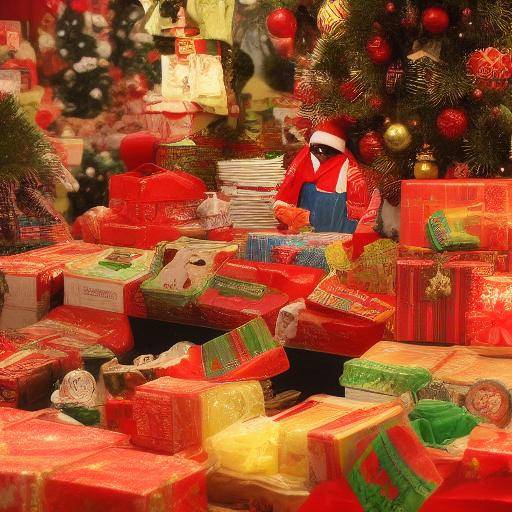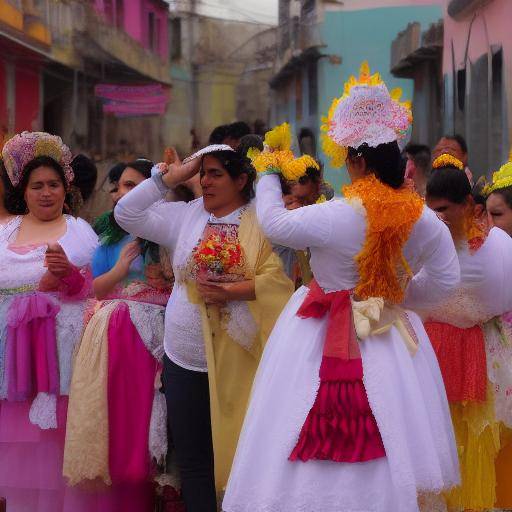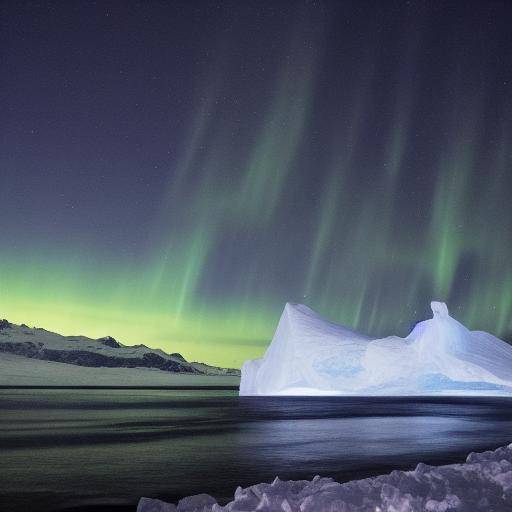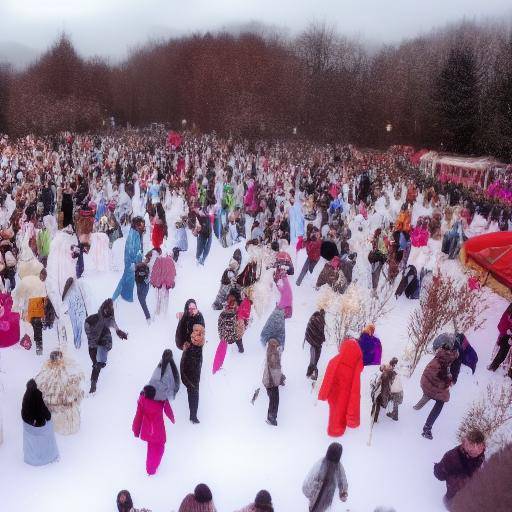
Winter, with its snow mantle and magical atmosphere, invites to celebrate festivals that honor the coldest season of the year. Throughout the world, winter holidays reflect the cultural identity of each community, attracting visitors and locals alike. From the colorful Christmas holidays to the traditional renewal rituals, winter festivals offer a window to the diversity and wealth of global traditions. In this article, we will explore the fascinating beauty of winter festivals, the exciting winter events and the magical celebrations that illuminate the dark and cold winter.
Introduction
Winter, with its mystery aura and snow-covered landscape, is a perfect time to celebrate festivals that fill the cold nights with light and color. Throughout the world, diverse communities join in festivities ranging from religious celebrations to cultural events and ancestral ceremonies. During these celebrations, you can appreciate the wealth of local traditions and the hospitality of the people who celebrate them. Throughout this article, we will explore the history, meaning, traditions and highlights of winter festivals in different parts of the world.
History and Background
Winter festivals have their roots in ancient practices and beliefs that sought to make sense to seasons and nature. Since time immemorial, cultures have celebrated the arrival of winter with rituals that marked the transition and renewal. In many societies, the winter solstice, the shortest day of the year, was a crucial moment that symbolized the struggle between light and darkness. These celebrations sought to pay tribute to nature and to thank for the harvest of the year, in addition to affirming the hope of the arrival of the longest days.
In Europe, the winter solstice gave rise to festivals such as Yule, celebrated by the Nordic peoples, and Saturnalia, a Roman festival in honor of the god Saturn. These festivals included rituals of purification, banquets, exchange of gifts and processions with torches. With the influence of Christianity, these traditions interwoven with the celebrations of Christmas. In addition, the tradition of the Christmas tree finds its roots in ancient pagan practices of decorating trees during the winter as a symbol of eternal life.
In Asia, festivals such as Dongzhi in China and Hogmanay in Scotland mark the winter solstice with traditions that reflect appreciation for harmony and balance in nature. In Latin America, the "Day of the Dead" in Mexico and other holidays welcome the winter with offerings to the deceased and celebrations that honor life and death. These rituals show the influence of nature and ancestral beliefs in the winter holidays, which continue to evolve and adapt today.
Analysis in Deep
Winter, with its frigid charm, poses challenges and opportunities for the holidays. Winter holidays often offer an opportunity for the community to gather and share their culture, which strengthens social ties. However, inclement winter weather can present logistical challenges for outdoor events. As climate change affects seasons, it can also influence how winter festivals are held. Technological advances and global trends have also changed the way these festivities are planned and enjoyed. It is therefore crucial to understand the current benefits and challenges facing winter festivals in order to preserve these celebrations in the future.
At present, there is a trend towards the creation of winter events that are sustainable and environmentally friendly. Many communities seek to reduce their carbon footprint and adopt more responsible practices during the holidays. In addition, winter tourism has experienced a boom, as more and more people seek unique experiences related to winter festivals, which has led to significant growth in the winter tourism industry.
Comprehensive review
Winter festivals are not only cultural events, but also play an important role in the economic development of communities. By attracting national and international visitors, these festivals generate economic activity in the form of tourism, hotels, gastronomy and handicraft sales. In turn, winter events offer opportunities to promote tourist destinations that could otherwise be less known. For example, the Sapporo Winter Festival in Japan attracts millions of visitors every year, becoming a key element for the local economy and the promotion of winter tourism in the region.
As for magical celebrations, winter festivals are often imbued with an atmosphere of fantasy and wonder. Artistic lighting, fireworks and theatrical performances aim to transport spectators to a dream world, creating a magical experience that captivates the senses and stimulates the imagination. These celebrations offer a breath of daily monotony and an opportunity to celebrate the joy and wonder of the winter season.
Comparative analysis
Winter festivals, winter events and magical celebrations share the quality of creating a special and memorable atmosphere during the winter season, but each has its own distinctive features. Winter festivals are often rooted in cultural and religious traditions, with an emphasis on historical meaning and local customs. On the other hand, winter events are often designed to attract a wider audience, incorporating recreational activities, concerts and shows that seek to entertain people of all ages. Meanwhile, magical celebrations focus on fantasy and wonder, using creativity and technology to create immersive experiences that transcend everyday life.
Practical Tips and Accessible Recommendations
For those who want to participate in winter holidays, it is important to be prepared for weather conditions and plan ahead to avoid setbacks. Appropriate clothing, choice of accommodation and research on local events and activities can contribute to a pleasant and safe winter experience. In addition, those who organize winter events should consider the implementation of sustainable and environmentally friendly practices, as well as the promotion of cultural diversity in their programmes.
Industry Perspectives and Expert Reviews
According to tourism and event experts, winter festivals will continue to experience significant growth, especially in regions where winter is a major season. Current trends, such as the demand for authentic experiences and the preference for less crowded destinations, offer opportunities for innovation in the planning and implementation of winter festivals. In addition, technological advances, such as increased reality and artificial intelligence, could be used to improve visitors' experience during winter events.
Case Studies and Real Life Applications
An outstanding example of the economic and cultural importance of winter festivals is the Carnival of Quebec in Canada. This annual celebration attracts visitors from around the world and has been instrumental in positioning Quebec as a renowned winter tourist destination. The carnival includes parades, ice sculpture competitions, family activities and concerts, and offers a wide range of experiences that highlight the cultural wealth and winter fun that the region has to offer.
Also, the Lyon Lights Festival in France is an example of how magical celebrations can transform a city into a dazzling show. During this festival, historical buildings are illuminated with artistic projections, creating an atmosphere of wonder and delight for visitors. This celebration has not only strengthened the identity of Lyon as a city of art and culture, but has also contributed to its tourist attraction during the winter season.
Future Trends and Predictions
As winter tourism continues to expand, winter festivals and winter events are expected to diversify to offer attractive experiences for both local and international visitors. A greater focus is on sustainability, with festivals that seek to minimize their environmental impact and highlight the importance of conservation of the natural environment. In addition, the integration of innovative technology, such as virtual reality and digital interactivity, could transform the way winter festivals are experienced, adding a new level of immersion and participation.
Conclusion
Winter festivals, with their rich cultural heritage, their magical environment and their contribution to economic development, offer a unique perspective on the diversity of celebrations around the world. From traditional festivities rooted in history to modern winter events full of creativity and entertainment, every winter occasion is an opportunity to celebrate life and the community. As the world continues to change, it is essential to preserve and value these holidays as a vivid expression of human identity and creativity.
Frequently asked questions
1. What is the oldest winter festival in the world?
The oldest winter festival in the world is the Chinese festival Dongzhi, which has more than 2000 years of history. This celebration marks the arrival of winter and the renewal of vital energy, with traditions that include the preparation and consumption of symbolic foods.
2. What is the economic impact of winter festivals?
Winter festivals can have a significant economic impact by attracting tourists and encouraging spending on accommodation, food, activities and souvenirs. In many cases, these events are fundamental to the local economy and to promote winter tourism in the region.
3. How do winter festivals adapt to climate change?
Climate changes have led the organizers of winter festivals to take measures to address unpredictable climate conditions, such as the installation of resistant temporary structures and the planning of alternative activities in closed spaces.
4. What are some unusual traditions at winter festivals?
Some unusual traditions include the launch of oranges at the Ivrea Festival in Italy, the ice bath at the Epiphany Festival in Russia and the giant ice sculpture at the Sapporo Winter Festival in Japan.
5. What role do magical celebrations play in winter festivals?
Magic celebrations seek to create an atmosphere of wonder and fantasy during winter festivals, using artistic lighting, fireworks shows and decorations to transform common spaces into extraordinary experiences.
6. How can I participate in a winter festival abroad?
If you are interested in participating in a winter festival abroad, it is important to investigate the event in advance to understand traditions, activities and requirements. Also, be sure to review the visa, accommodation and transportation procedures to facilitate your participation in the festival.
With detailed information on winter festivals, winter events and magical celebrations in different parts of the world, this article offers a broad perspective on the wealth and diversity of winter traditions. From the history and evolution of these celebrations to the exploration of their contemporary applications and future trends, winter festivals remain an important pillar of global culture, bringing joy and union to communities around the world.

